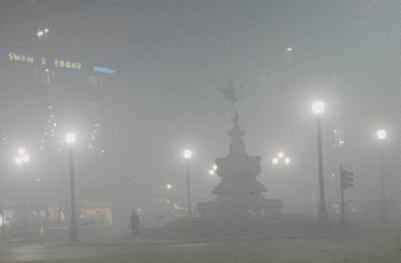The Great Smog [smoke + fog] of ’52 or Big Smoke, was a severe air pollution event that affected London during December 1952 … although it was not thought to be a significant event at the time, with London having experienced many smog events in the past, so called “pea soupers“. However, government medical reports in the following weeks estimated that up until 8th December 4,000 people had died prematurely and 100,000 more were made ill because of the smog’s effects on the human respiratory tract. More recent research suggests that the total number of fatalities was considerably greater at about 12,000. Wikipedia
A study carried out between 1996 and 2004 at the university of Birmingham suggested that high levels of pollution may have contributed to the deaths of thousands of people in England from pneumonia in recent years: 386,374 people died of pneumonia during the eight years examined, linked to a range of pollutant levels, including engine exhaust emissions. “High mortality rates were observed in areas with elevated ambient pollution levels,” said Professor George Knox, who wrote the report. “The strongest single effect was an increase in pneumonia deaths.”
The benefits of a reduction in air pollution alone justify action on climate change, say the authors of a new report published in the Guardian as action on climate change “would save millions of lives a year by the end of the century purely as a result of the decrease in air pollution”.
“It is pretty striking that you can make an argument purely on health grounds to control climate change,” said Dr. J. Jason West, Assistant Professor at the Department of Environmental Sciences and Engineering, University of North Carolina. His team concluded that millions of premature deaths a year would be avoided, as well as making considerable savings, if fossil fuel emissions were reduced.






